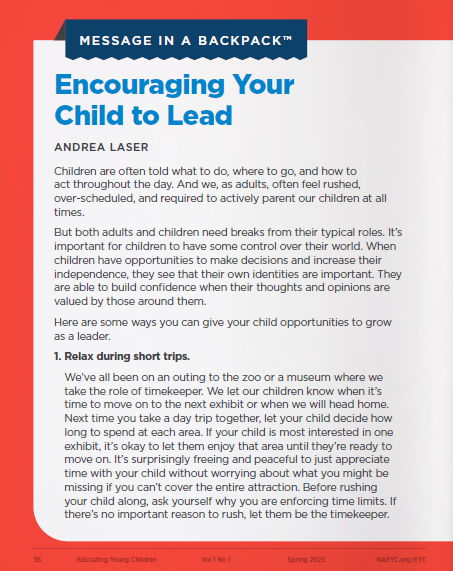Message in a Backpack.™ Encouraging Your Child to Lead

You are here
Children are often told what to do, where to go, and how to act throughout the day. And we, as adults, often feel rushed, over-scheduled, and required to actively parent our children at all times.
But both adults and children need breaks from their typical roles. It's important for children to have some control over their world. When children have opportunities to make decisions and increase their independence, they see that their own identities are important. They are able to build confidence when their thoughts and opinions are valued by those around them.
Here are some ways you can give your child opportunities to grow as a leader.
1. Relax during short trips.
We’ve all been on an outing to the zoo or a museum where we take the role of timekeeper. We let our children know when it’s time to move on to the next exhibit or when we will head home. Next time you take a day trip together, let your child decide how long to spend at each area. If your child is most interested in one exhibit, it’s okay to let them enjoy that area until they’re ready to move on. It’s surprisingly freeing and peaceful to just appreciate time with your child without worrying about what you might be missing if you can't cover the entire attraction. Before rushing your child along, ask yourself why you are enforcing time limits. If there’s no important reason to rush, let them be the timekeeper.
2. Let them play.
Children love play! It includes so many activities, like dramatic play, building, creating, engaging with nature, playing board games, and so much more. Allow your child to be in charge of their play. Have them decide what they want to do, how to do it, and who they want to play with.
When your child is playing or creating, let them think about and decide on the “why” before enforcing boundaries. For example, instead of insisting on playing a board game by the rules, shift your approach. Allow your child to decide by saying, “Let’s try the game your way. Can you teach me?” This can help both of you enjoy and engage with each other.
3. Expand on their ideas.
When your child talks with you, listen, ask questions, and try to expand on what they say, even if it seems odd or unrealistic to you. By allowing children to communicate ideas and helping them expand on their thoughts, we help children develop their divergent thinking and build confidence. It encourages their creative thinking, and shows them our respect. This also helps avoid unnecessary power struggles.
Practicing different methods that give your child a sense of control and independence in their world can rejuvenate your ability to be a good leader for your child. After all, we could all use a turn leading—and following the leader.
Download this issue's Message in a Backpack™ here!
This edition of Message in a Backpack was adapted from an article on NAEYC’s For Families website.
Copyright © 2025 by the National Association for the Education of Young Children. See Permissions and Reprints online at NAEYC.org/resources/permissions.
Andrea Laser, EdD, is a teaching assistant professor at the University of Colorado Denver.
